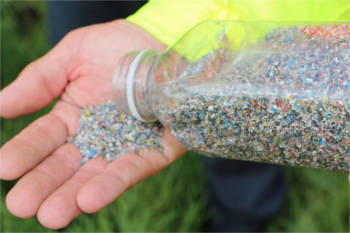Motorists on the A689 near Sedgefield in County Durham are now driving along a road built using a controversial technique involving waste plastic.
Durham County Council is trailing the technology as part of recently completed work to resurface a section of the A689 with hot rolled asphalt.
 The process involves mixing crumb-sized waste plastic pellets with the bitumen at high temperatures so as to prevent putting the plastic in landfill.
The process involves mixing crumb-sized waste plastic pellets with the bitumen at high temperatures so as to prevent putting the plastic in landfill.
However, bitumen manufactuers claim the plastic cannot join with the bitumen and effectively ends up being dumped in the road rather than in landfill rather than part of a genuine 'recycling' process.
Bitumen manufacturers have told Transport Network that confidence in the process is untested and there is no evidence to suggest the road will be as or more durable as manufactuters have claimed.
John Reed, the council’s head of technical services, said: 'In this trial, we incorporated waste plastics into the asphalt instead of traditional bitumen. This will help divert plastics that are difficult to recycle from incineration and landfill and reduce our carbon emissions.
'We are confident that this new technology will perform at least as well as the conventional method.'
The council’s surfacing contractor, Rainton Construction, sources the plastic from a Scottish company, MacRebur Limited. MacRebur has developed a process of turning waste packaging and insulation that wouldn’t normally be recycled into a plastic crumb, which can be mixed into the asphalt.
In this scheme, the council used 6.5 tonnes of plastic, which is the equivalent of 60,000 plastic shopping bags.
David Wykes, MacRebur’s business development manager, said: 'Our products are able to use mixtures of these polymers, which can then be added to asphalts, helping to reduce carbon dioxide emissions, reduce the demands on fossil fuel bitumen and the amount of plastic that would usually be disposed of.'





